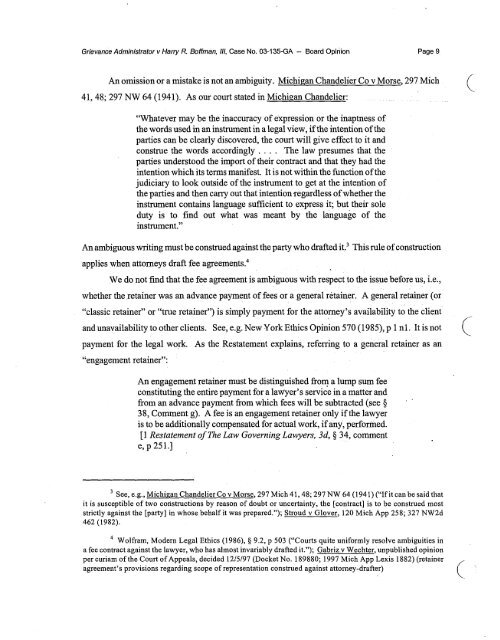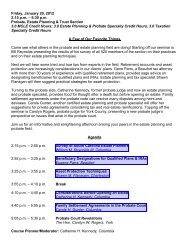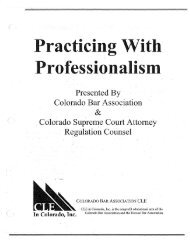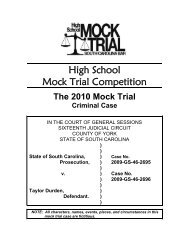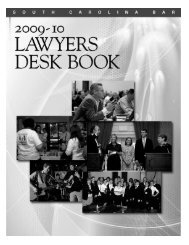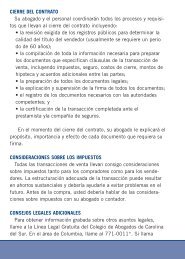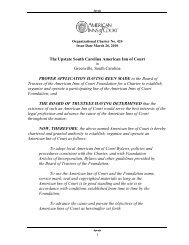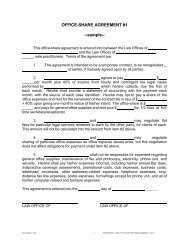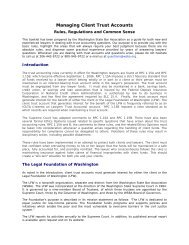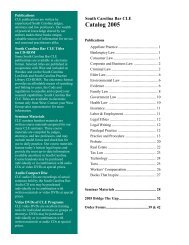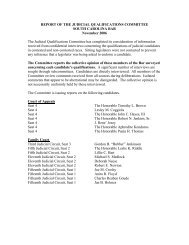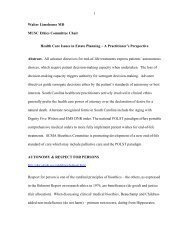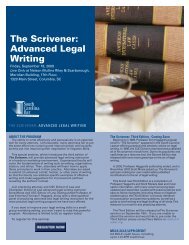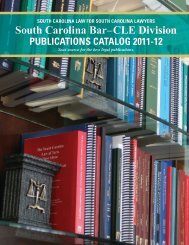Tips and Tools for a Successful Practice - South Carolina Bar ...
Tips and Tools for a Successful Practice - South Carolina Bar ...
Tips and Tools for a Successful Practice - South Carolina Bar ...
Create successful ePaper yourself
Turn your PDF publications into a flip-book with our unique Google optimized e-Paper software.
Grievance Administrator v Harry R. Boffman, III, Case No. 03-135-GA -- Board Opinion Page 9<br />
An omission or a mistake is not an ambiguity. Michigan Ch<strong>and</strong>elier Co v Morse, 297 Mich (<br />
41,48; 297 NW 64 (1941). As our court stated in Michigan Ch<strong>and</strong>elier:<br />
"Whatever may be the inaccuracy ofexpression or the inaptness of<br />
the words used in an instrument in a legal view, ifthe intentionofthe<br />
parties can be clearly discovered, the court will give effect to it <strong>and</strong><br />
construe the words accordingly . . .. The law presumes that the<br />
parties understood the import oftheir contract <strong>and</strong> that they had the<br />
intention which its terms manifest. Itis not within the function ofthe<br />
judiciary to look outside ofthe instrument to get at the intention of<br />
the parties <strong>and</strong> then carry out that intention-regardless ofwhether the<br />
instrument contains language sufficient to express it; but their sole<br />
duty is to find out what was meant by the language of the<br />
instrument."<br />
An ambiguous writing mustbe construed against the party who drafted it. 3 This rule ofconstruction<br />
applies when attorneys draft fee agreements. 4<br />
We do not find that the fee agreement is ambiguous with respect to the issue be<strong>for</strong>e us, i.e.,<br />
whether the retainer was anadvance payment offees or a general retainer. A general retainer (or<br />
"classic retainer" or "true retainer") is simply payment <strong>for</strong> the attorney's availability to the client<br />
<strong>and</strong> unavailability to other clients. See, e.g. New York Ethics Opinion 570 (1985), P 1 n1. Itis not<br />
payment <strong>for</strong> the legal work. As the Restatement explains, referring to a general retainer as an<br />
"engagement retainer":<br />
c<br />
An engagement retainer must be distinguished fro~ a lump sum fee<br />
constituting the entire payment <strong>for</strong> a lawyer's service in a matter <strong>and</strong><br />
from an advance payment from which fees will be subtracted (see §<br />
38, Comment g). A fee is an engagement retainer only ifthe lawyer<br />
is to be additionally compensated <strong>for</strong> actual work, ifany, per<strong>for</strong>med.<br />
[1 Restatement ofThe Law Governing Lawyers, 3d, § 34, comment<br />
e, p 251.]<br />
3 See, e.g., Michigan Ch<strong>and</strong>elier Co v Morse, 297 Mich 41, 48; 297 NW 64 (1941) ("Ifit can be said that<br />
it is susceptible of two constructions by reason of doubt or uncertainty, the [contract] is to be construed most<br />
strictly against the [party] in whose behalf it was prepared."); Stroud v Glover, 120 Mich App 258; 327 NW2d<br />
462 (1982).<br />
4 Wolfram, Modern Legal Ethics (1986), § 9.2, P 503 ("Courts quite uni<strong>for</strong>mly resolve ambiguities in<br />
a fee contract against the lawyer, who has almost invariably drafted it."); Gabriz v Wechter, unpublished opinion<br />
per curiam ofthe Court ofAppeals, decided 12/5/97 (Docket No. 189880; 1997 Mich App Lexis 1882) (retainer<br />
agreement's provisions regarding scope of representation construed against attorney-drafter) ( ~


